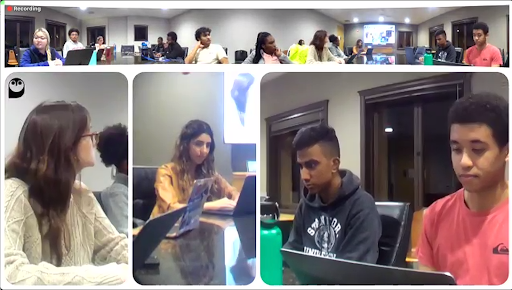The Undergraduate Senate (UGS) debated nominations to the new Academic Integrity Working Group as some senators raised concerns about one of the nominees for the upcoming term.
The group’s self-described mission is to “evaluate equitable practices for proctoring in-person examinations through a multi-year study” in its first year of operations. It was created following the Faculty Senate’s contentious resolution to authorize exam proctoring this April.
The nominee under scrutiny by senators was Xavier Millan ’26, who previously was a member of the Committee of 12 (C-12). Millan currently serves on the Board of Conduct Affairs.
As both positions were involved in drafting the C-12 proposal, UGS co-chair Diego Kagurabadza ’25 explained that there was worry Millan may not bring a fresh set of eyes to the group given his experience working on C-12.
Millan said he served less than four months on the C-12 Committee, and that his primary role was student outreach.
The language of the proposal had already been near-finalized when Millan joined the committee, he said. As a computer science major, Millan hopes to represent Stanford’s engineering and computer science communities, two groups that are particularly impacted by proctoring policies.
Communications Committee Chair Ava Tiffany ’26 questioned why there was so much back-and-forth over Millan’s appointment, stressing the delayed timeline.
“He has a really good reason to do [the job], he’ll put the time in, he’s dedicated,” Tiffany said. “That really truly is all that should matter.”
Senator Ivy Chen ’26, having worked with Millan on Frosh Council, vouched for his work ethic, skill sets and character. “No matter what he does, he’s very hardworking,” she said.
The senators tabled the discussion for a later date.
In addition, the UGS unanimously approved a $31,800 funding recommendations package that included 20 quick, 12 standard, and four reserve grants for club funding, social events and educational information sessions.
The Senate also continued a dialogue on the University’s alcohol policies. Following up on last week’s conversation about mandated reporting, Steve Ross, a liaison from the Office of Student Engagement, explained that dorm Resident Assistants are mandated to report incidents of alcohol, specifically when they relate to medical distress or disruptions to the community. Appropriations Committee Chair Ishaan Singh ’24 reiterated that open-door alcohol regulation is not currently an official, codified Stanford policy.
The UGS also introduced three new pieces of legislation: a joint resolution congratulating Democracy Day organizers authored by Kagurabadza, a bill to establish On Call as an ASSU Service Organization by Kagurabadza and a joint resolution on institutional airport shuttle services by Chen and Senator Isaac Nehring ’26. The Senate will be looking at these in the coming weeks.
